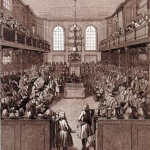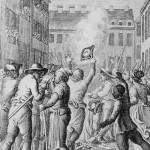Articles tagged with: stamp act
Stamp Act »

The was nullified before it went into effect and was repealed by parliament on March 18, 1766 under the Marquis of Rockingham.
In the summer of 1765 King George III fired George Grenville and replaced him with Charles Watson-Wentworth, Marquis of Rockingham. For the new Prime Minister the only alternative to repealing the tax was a long and costly civil war with the American colonies. Britain, as the world greatest power, could not give up on the decision to uphold the tax and give in to mobs and activist in its …
Documents, Stamp Act »

The original text of the 1765 Stamp Act from the British Parliament makes an interesting read despite its length. For example it lists some interesting items that have become subject to the tax. “And for and upon every pack of playing cards, and all dice, which shall be sold or used within the said colonies and plantations, the several stamp duties following. For every pack of such cards, the sum of one shilling. And for every pair of such dice, the sum of ten shillings.
British Taxation in Colonial America, Timeline of British Acts on America »

During the early seventeenth century Britain created a mercantile system to maintain close control and regulate trade of its colonies, they tried to make sure all revenues generated from the trade with its American colonies went back to the crown. This system did not allow its colonies to freely trade with other countries other than Britain. The first of its protective measures was the The law was designed to protect British economic interests in colonial trade and to protect its industry against the rapidly growing Dutch navigation trade, it …
Stamp Act, Timeline of British Acts on America »

What was the Stamp Act?
The Stamp Act was a tax imposed by the British government on the American colonies. British taxpayers already paid a stamp tax and Massachusetts briefly experimented with a similar law, but the Stamp Act imposed on colonial residents went further than the existing ones. The primary goal was to raise money needed for military defenses of the colonies.
This legislative act was initiated by the British prime minister and adopted by the British Parliament. The decision was taken on March 1765 but did not take effect until …



